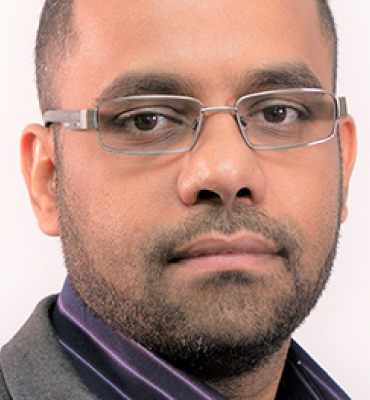
Dr. Shadi S. Basurra
Senior Lecturer
School of Computing and Digital Technology
- Email: Shadi.basurra@bcu.ac.uk
Shadi Basurra received his Bsc (Hons) degree in Computer Science from Exeter University, the UK, and MSc in Distributed Systems and Networks from Kent University at Canterbury, UK. He obtained his Ph.D. from the University of Bath in collaboration with Bristol University. After completing his Ph.D., Shadi worked at Sony Corporation developing Goal Decision Systems, he then moved on to work as a Research Fellow at the Zero Carbon Lab – Birmingham City University. He recently joined the Computer Science Centre as a Senior Lecturer in Software Engineering at Birmingham City University.
He was awarded The Yemen President National Science Prize (2010), Best Presentation at Meeting of Minds – Bath 2012 and MEX Scholarship 2013, (Toshiba ltd, Great Western Research and Yemen gov. for Ph.D. scholarship 2009) and various academic funding grants. He has had extensive experience in dynamic modeling and simulation of buildings; software development of predictive control algorithms.
He worked solidly on theoretical and technical aspects of networking and mobile computing. He has designed adaptive communication protocols that combined distance vector and link-state routing protocols for wireless mobile ad hoc networks in order to increase performance efficiency and energy saving. He was the co-investigator and technical lead for BCU work packages in the nationally recognized project Retrofit Plus. Retrofit Plus project secured a £1.2 million external fund from Innovate UK for scaling up retrofit of the nation’s homes. Shadi research interests include simulation and emulation of networks (vehicular, mesh and sensor ad hoc network), game theory, multi-agent systems, multi-objective optimisation, model calibration and dynamic simulation of zero-carbon design and retrofit of buildings.
His recent research is related to Edge Computing, in particular, the use of the lightweight machine and deep learning techniques that allow the learning and inference to occur on devices with limited resources, e.g. IoT devices, to aid rapid decision-making whilst maintaining the highest possible accuracy in Classification and Regression Analysis. He has published a number of peer-reviewed scientific publications in international conferences, journals, and has taught postgraduate and undergraduate courses in software engineering and networking.
- Vehicular, mesh and sensor ad hoc networks
- Game theory
- Multi-agent systems, multi-objective optimisation
- Model calibrations and dynamic simulation for zero carbon design and retrofit of buildings
- Machine learning
- Edge computing
- Bsc (Hons) degree in Computer Science from Exeter University, the UK
- MSc in Distributed Systems and Networks from Kent University at Canterbury, UK
- Ph.D. from the University of Bath in collaboration with Bristol University
- Machine learning
- Edge computing
- Multi-agent systems, multi-objective optimization
- Model calibrations and dynamic simulation for zero carbon design and retrofit of buildings
- Alhalabi, Besher and Gaber, Mohamed Medhat and Basurra, Shadi (2019) EnSyth: A Pruning Approach to Synthesis of Deep Learning Ensembles. In: IEEE International Conference on Systems, Man, and Cybernetics (IEEE SMC 2019), 06-09 October, 2019, Bari, Italy
- Abdallah, Fatima and Basurra, Shadi and Gaber, Mohamed Medhat (2018) A Non-intrusive Heuristic for Energy Messaging Intervention Modelled using a Novel Agent-based Approach. IEEE Access. p. 1. ISSN 2169-3536
- Fatima Abdallah, Shadi Basurra and Mohamed Medhat Gaber, Cascading Probability Distributions in Agent-based Models: An Application to Behavioural Energy Wastage, The 17th International Conference on Artificial Intelligence and Soft Computing ICAISC 2018.
- Gaber, Mohamed; Aneiba, Adel; Basurra, Shadi; Batty, Oliver; Elmisery, Ahmed; Kovalchuk, Yevgeniya; Ur Rehman, Muhammad Habib, Internet of Things and Data Mining:From Applications to Techniques and Systems, WIREs Data Mining and Knowledge Discovery < impact factor 2.11>
- Fatima Abdallah, Shadi Basurra and Mohamed Medhat Gaber, An Agent-based Collective Model to Simulate Peer Pressure Effect on Energy Consumption, 10th International Conference on Computational Collective Intelligence (ICCCI 2018) which will be held in Bristol, UK on 30 March 2018.
- Fatima Abdallah, Shadi Basurra and Mohamed Gaber, A Hybrid Agent-Based and Probabilistic Model for Fine-grained Behavioural Energy Waste Simulation, 29 IEEE International Conference on Tools with Artificial Intelligence (ICTAI 2017), Boston, USA, 2017.
- Basurra, Shadi and Jankovic, L., Performance Comparison between KNN and NSGA-II Algorithms as Calibration Approaches for Building Simulation Models, in Proceedings of International Building Performance Simulation Association (IBPSA-England), September, 2016, Newcastle, UK.
- Basurra, S., Halla Huws and Jankovic, L., The Use of Optimisation in the Calibration of Building Simulation Models, 14th International Conference of the International Building Performance Simulation Association (IBPSA), Hyderabad, 2905-2912, 2015.
- Basurra, S. and Jankovic, L., Bringing Building Simulation to a Wider Audience – A Web Based Simulation and Optimisation System,. 14th International Conference of the International Building Performance Simulation Association (IBPSA), Hyderabad, pp. 83-90, December, 2015.
- Shadi Saleh Basurra, Marina De Vos, Julian Padget, Yusheng Ji, Tim Lewis, Simon Armour: Energy efficient zone based routing protocol for MANETs. Ad Hoc Networks 25: 16-37 (2015)
- Chris Bevan, Lia Emanuel, Julian Padget, Juani Swart, John Powell and Shadi Basurra. Factors in the emergence and sustainability of self-regulation, Principles, Artefacts and Theories(SOCIAL.PATH), AISB Convention, pp.6-13, April 2013.
- Basurra, Shadi Saleh; Ji, Yusheng; De Vos, Marina; Padget, Julian; Lewis, Tim; Armour, Simon, Social-Aware Routing for Wireless Mesh Networks, IEEE Vehicular Technology Conference (VTCFall), pp.1-5, 3-6 September 2012.
